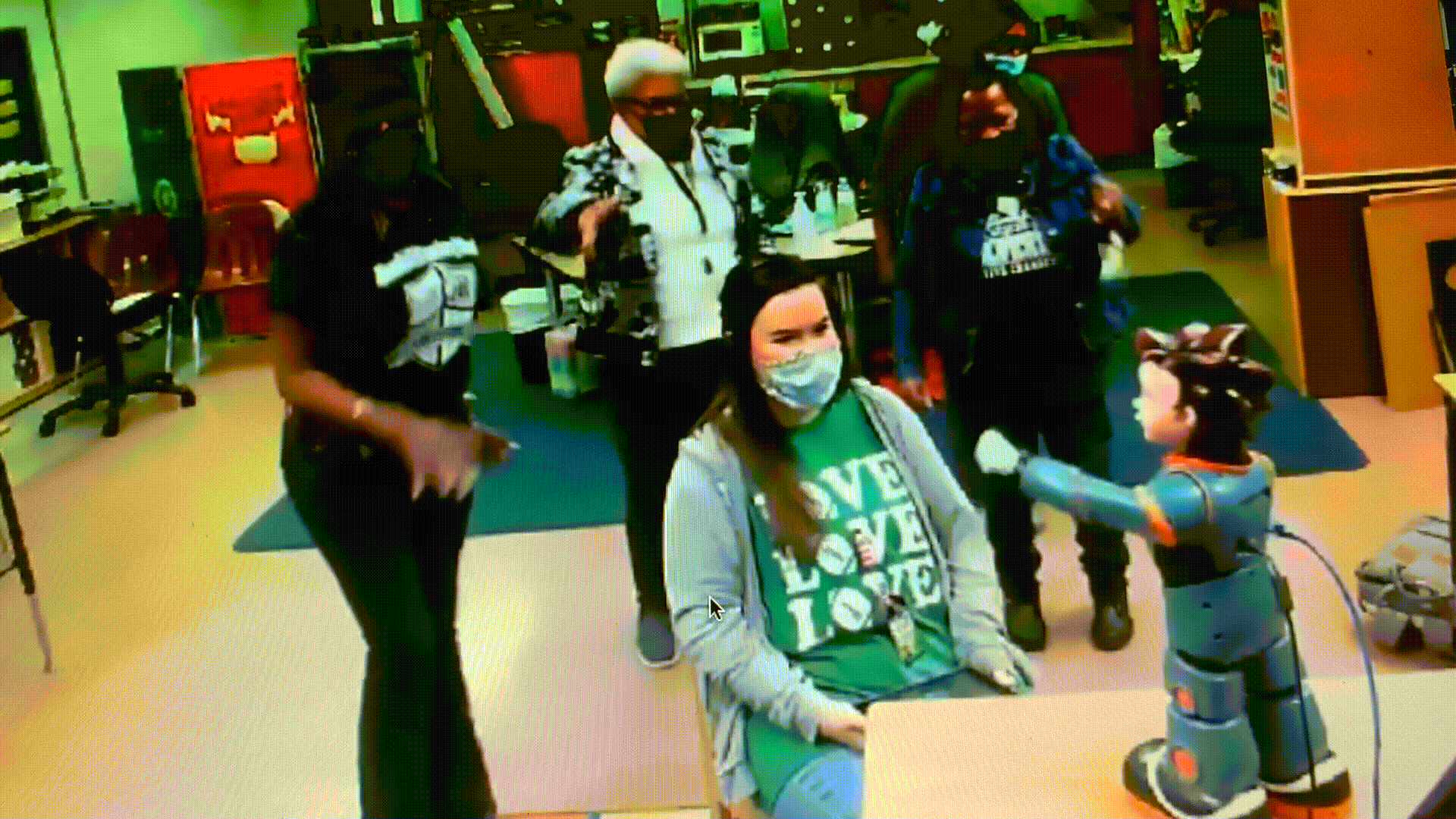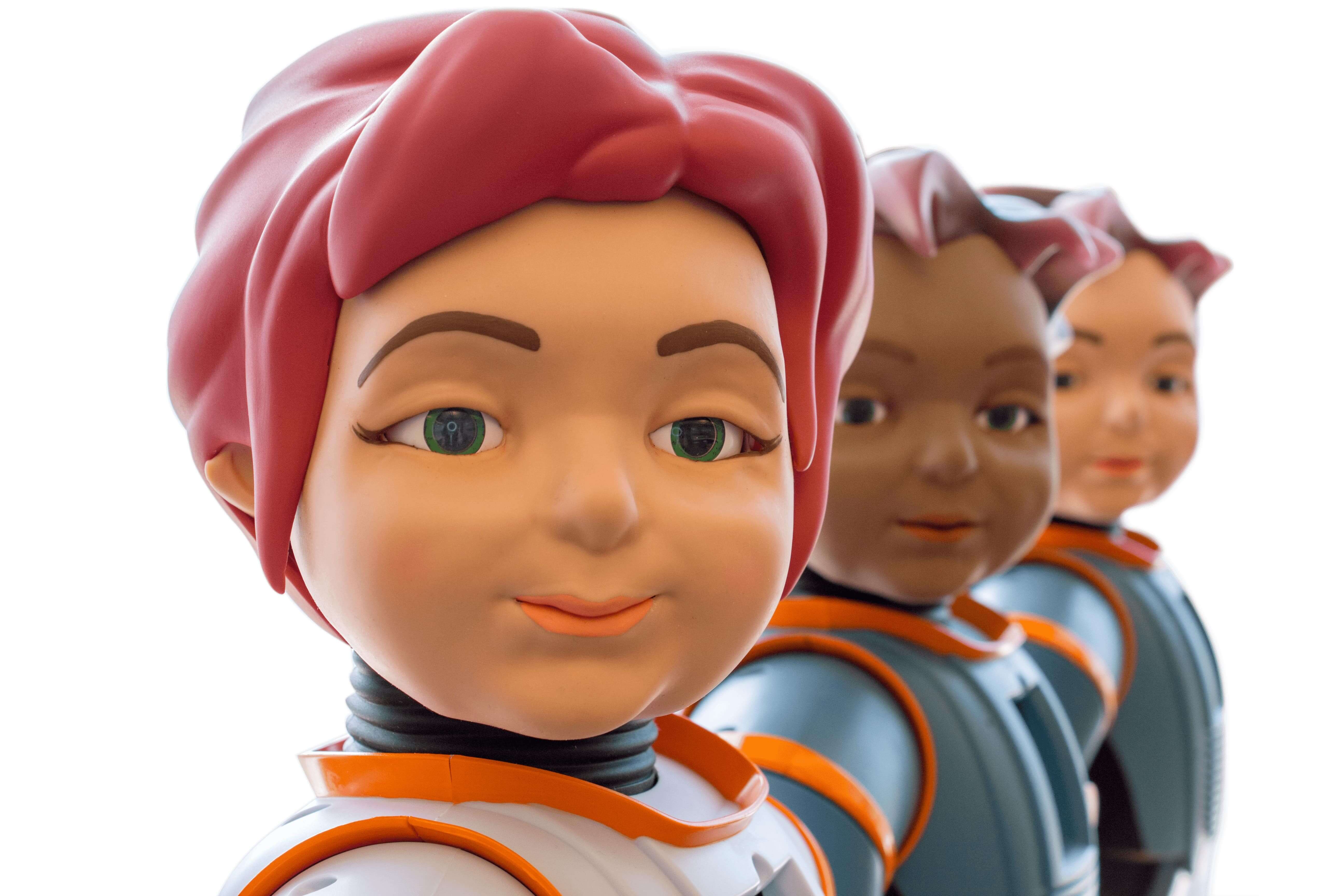Facilitate SEL Programs, Regardless of Location.
Introducing, Avatar.
Our remote learning technology was designed and developed to support special educators in their duty to provide FAPE under IDEA. Endorsed by CASE, our evidence-based program has been shown to improve outcomes for K12 students.
Want More Information?
Schedule some time with our team to discuss implementation and pricing.
Assistive Technology That Improves Outcomes.
As a research-driven company, we take evidence-based and assistive technology methodology to heart. We couldn't be more proud of the results or more inspired by the innovators thinking differently about student success and IEP goal progress.
x
Increase in Time on Task
%
Demonstrated Skill Mastery
$
Saved Per Student Per Year
Professional Development That Empowers Special Educators.
The best way to improve student outcomes is, without a doubt, best achieved by equipping and investing in educators. Our professional development is crafted to motivate and inspire the educators deploying RoboKind programing and technology, with a focus on equity, inclusivity, and data-driven efficiency. Oh, it also happens to be fun!

![RK Professional Learning Courses 2021-2022.pptx[51].001](https://www.robokind.com/hubfs/RK%20Professional%20Learning%20Courses%202021-2022.pptx%5B51%5D.001.jpeg)
![RK Professional Learning Courses 2021-2022.pptx[51].002-1](https://www.robokind.com/hubfs/RK%20Professional%20Learning%20Courses%202021-2022.pptx%5B51%5D.002-1.jpeg)
![RK Professional Learning Courses 2021-2022.pptx[51].003](https://www.robokind.com/hubfs/RK%20Professional%20Learning%20Courses%202021-2022.pptx%5B51%5D.003.jpeg)
![RK Professional Learning Courses 2021-2022.pptx[51].004](https://www.robokind.com/hubfs/RK%20Professional%20Learning%20Courses%202021-2022.pptx%5B51%5D.004.jpeg)

![RK Professional Learning Courses 2021-2022.pptx[51].001](https://www.robokind.com/hubfs/RK%20Professional%20Learning%20Courses%202021-2022.pptx%5B51%5D.001.jpeg)
![RK Professional Learning Courses 2021-2022.pptx[51].002-1](https://www.robokind.com/hubfs/RK%20Professional%20Learning%20Courses%202021-2022.pptx%5B51%5D.002-1.jpeg)
![RK Professional Learning Courses 2021-2022.pptx[51].003](https://www.robokind.com/hubfs/RK%20Professional%20Learning%20Courses%202021-2022.pptx%5B51%5D.003.jpeg)
![RK Professional Learning Courses 2021-2022.pptx[51].004](https://www.robokind.com/hubfs/RK%20Professional%20Learning%20Courses%202021-2022.pptx%5B51%5D.004.jpeg)

![RK Professional Learning Courses 2021-2022.pptx[51].003](https://www.robokind.com/hubfs/RK%20Professional%20Learning%20Courses%202021-2022.pptx%5B51%5D.003.jpeg)
![RK Professional Learning Courses 2021-2022.pptx[51].004](https://www.robokind.com/hubfs/RK%20Professional%20Learning%20Courses%202021-2022.pptx%5B51%5D.004.jpeg)

![RK Professional Learning Courses 2021-2022.pptx[51].001](https://www.robokind.com/hubfs/RK%20Professional%20Learning%20Courses%202021-2022.pptx%5B51%5D.001.jpeg)
![RK Professional Learning Courses 2021-2022.pptx[51].002-1](https://www.robokind.com/hubfs/RK%20Professional%20Learning%20Courses%202021-2022.pptx%5B51%5D.002-1.jpeg)
![RK Professional Learning Courses 2021-2022.pptx[51].003](https://www.robokind.com/hubfs/RK%20Professional%20Learning%20Courses%202021-2022.pptx%5B51%5D.003.jpeg)
![RK Professional Learning Courses 2021-2022.pptx[51].004](https://www.robokind.com/hubfs/RK%20Professional%20Learning%20Courses%202021-2022.pptx%5B51%5D.004.jpeg)

![RK Professional Learning Courses 2021-2022.pptx[51].001](https://www.robokind.com/hubfs/RK%20Professional%20Learning%20Courses%202021-2022.pptx%5B51%5D.001.jpeg)
![RK Professional Learning Courses 2021-2022.pptx[51].002-1](https://www.robokind.com/hubfs/RK%20Professional%20Learning%20Courses%202021-2022.pptx%5B51%5D.002-1.jpeg)
![RK Professional Learning Courses 2021-2022.pptx[51].003](https://www.robokind.com/hubfs/RK%20Professional%20Learning%20Courses%202021-2022.pptx%5B51%5D.003.jpeg)
![RK Professional Learning Courses 2021-2022.pptx[51].004](https://www.robokind.com/hubfs/RK%20Professional%20Learning%20Courses%202021-2022.pptx%5B51%5D.004.jpeg)

SEL Curriculum That Builds Confidence.
Our mission is simple: to support educators in helping their students master social-emotional skills and find the confidence they need to build life-long, meaningful human-to-human interactions. As a developmental behavioral approach, based on development theory and the principles of applied behavioral analysis (ABA), robots4autism® is a manualized practice that maintains a high level of fidelity.
| Module Group | Description |
|---|---|
|
Introductory
|
Students meet Milo and play 6 games to determine prerequisite skills for curriculum.
|
|
Calm Down
|
Student explore basic calm down tools with Milo before practicing and applying to social situations.
|
|
Conversational
|
Milo teaches common social skills and scenarios students need know when participating in conversations.
|
|
Emotional
|
Using facial-expressivity, Milo demonstrates basic emotions, allowing the student to recognize and replicate.
|
|
Situational
|
Social scenarios are played out while the student learns the ins-and-outs of playdates & birthday parties.
|
Evidence-based Practices Deployed in robots4autism®
Technology-aided Instruction & Intervention (TAII):
Leveraging technology to improve outcomes is a core value of RoboKind and the robots4autism® program. Delivered by Milo, our robot, the program is facilitated by educators and aimed at student mastery of social skills and communication.
Visual Supports:
When paired with spoken words, visual supports have been shown to improve the facilitation of learning and communication between students and educators. With each module, Milo uses multiple, consistent visual supports - including, facial expressivity, chest screen icons, and app-based interactivity - to encourage and reinforce target behaviors and skills.
Social Narratives:
Throughout the curriculum, Milo presents narratives that describe social situations in detail, highlighting relevant cues and offering examples of appropriate responding. These social narratives can be individualized according to student needs and, importantly, are always presented in an emotionally safe, positive way.
Video & Natural Modeling:
Each lesson contains videos structured to clearly demonstrate desired target behaviors and skills. Milo, acting as narrator, describes the video to the student. As the student progress through the curriculum, the video sensors allow the educator to extend the learning by creating video self-models.
Prompting (Verbal & Visual):
Verbal, gestural, or physical prompts assist students as they acquire or engage in targeted behaviors and skills. These prompts are generally given by Milo, the corresponding app, and an adult before or as the student attempts to use a skill. Like core vocabulary, these prompts remain consistent throughout modules.
Reinforcement of Target Behaviors:
Practice makes perfect, right? Mastery requires instruction on basic concepts, role-playing or practice, and feedback in order to help students with autism spectrum disorders (ASD) acquire appropriate communication, play, and social skills. At its core, Milo and the RoboKind curriculum is a training tool that improves generalization and mastery.
Core Vocabulary:
Our entire curriculum is designed around the use of core vocabulary that simplifies the language addressed to and by the student. Specifically, this allows the student to repeat target words/concepts across multiple contexts and situations and is a core factor in improving generalization.
Today, our 10 robots have been able to work with 55 students across 10 elementary schools, serving as a highly effective therapeutic solution and intervention for improving the social, communication and behavior skills of students with Autism SpectrumDisorder (ASD).

Jessica McCracken
Special Education Case Manager | Philadelphia ISD
My students like the calm down strategies, whether or not they are working with Milo. We have a quiet corner and I see them using the same strategies that Milo previously taught them. They are getting something from it; that is the most important piece.

Samantha Bear
Special Education Teacher | Menomonee Falls High School
Milo has become a very efficient tool in helping our students with autism improve outcomes in terms of their social-emotional learning, their speech pragmatics, and their behavior.

Dr. Lisa Raiford
Autism Education Associate | Dept. Of Education, South Carolina
For even our most severe cases, Milo and RoboKind’s program helped our students make tangible progress toward their IEP goals. And, it only took a handful of lessons. The student response is more than promising.

Joseph Mahoney
Director of Behavioral & Mental Health | PA Intermediate Unit 1
Today, our 10 robots have been able to work with 55 students across 10 elementary schools, serving as a highly effective therapeutic solution and intervention for improving the social, communication and behavior skills of students with Autism SpectrumDisorder (ASD).

Jessica McCracken
Special Education Case Manager | Philadelphia ISD
My students like the calm down strategies, whether or not they are working with Milo. We have a quiet corner and I see them using the same strategies that Milo previously taught them. They are getting something from it; that is the most important piece.

Samantha Bear
Special Education Teacher | Menomonee Falls High School
Milo has become a very efficient tool in helping our students with autism improve outcomes in terms of their social-emotional learning, their speech pragmatics, and their behavior.

Dr. Lisa Raiford
Autism Education Associate | Dept. Of Education, South Carolina
For even our most severe cases, Milo and RoboKind’s program helped our students make tangible progress toward their IEP goals. And, it only took a handful of lessons. The student response is more than promising.

Joseph Mahoney
Director of Behavioral & Mental Health | PA Intermediate Unit 1
Today, our 10 robots have been able to work with 55 students across 10 elementary schools, serving as a highly effective therapeutic solution and intervention for improving the social, communication and behavior skills of students with Autism SpectrumDisorder (ASD).

Jessica McCracken
Special Education Case Manager | Philadelphia ISD
My students like the calm down strategies, whether or not they are working with Milo. We have a quiet corner and I see them using the same strategies that Milo previously taught them. They are getting something from it; that is the most important piece.

Samantha Bear
Special Education Teacher | Menomonee Falls High School
Frequently asked questions
Does robots4autism®: Avatar meet requirements for federal, state, and local funding?
Absolutely! In fact, most of our customers fund RoboKind programs with publicly available funds for schools and districts.
That includes CARES and HEROES Act funding.
Our technology is an assistive hardware and software program that helps educators fulfill their duties under the provisions set by IDEA. As a developmental behavioral approach, based on development theory and the principles of applied behavioral analysis (ABA), robots4autism® is a manualized practice that maintains a high level of fidelity.
What empirical research does RoboKind have or has added to?
One of the things we are most proud of is our commitment to pushing our collective understanding of autism and, generally, social-emotional developmental disabilities. To date, our partner researchers have demonstrated the value of assisted technology in improving student outcomes. Below are some links to relevant executive summaries. Our team is happy to provide more details upon request.
Study with South Carolina's Dept. of Education
IESD Case Study: McCarthy Teszler School
UT Dallas Callier Center: Using Humanoid Robots as a Co-therapist with Children with ASD
Do you offer professional development and facilitator training?
Yes! In fact, we are very proud of our professional development department, helmed by Mary Shaw.
Each robots4autism® program includes initial facilitator training. Professional development credits (1 credit per hour) can be purchased at any point during your RoboKind implementation. If you are interested in purchasing more credits, simple reach out to your customer success representative!
Is there a demo I can share with my educator colleagues?
There is! Check out a couple of customizable demos below:
robots4autism®: Experience the social-emotional learning program that helps students build the confidence and skill mastery they need to build lifelong relationships. Watch the Demo.
robots4STEM®: Send your students to space and watch them master early coding and computer science skills that help them realize their potential to change the world. Watch the Demo.
Do we have flexibility in implementation procedures?
Once you team approves a quote and signs a PO, our implementation process can begin. Each implementation follows guiding principles according to your district and / or school size, number of students, facilitators, location, etc. Each on is customized to our partners' needs.
We offer a variety of implementation models across multiple segments: place of learning (in-person, blended, fully-remote), timing (needed it yesterday, phased, next school year), location (district, single site, multi-school itinerant), and unique scenarios (assistive teaching, coding across the curriculum, and sensory rooms).
How much does the program cost?
As you might expect, program costs vary by implementation (e.g. number of robots, district v. single site, number of students, etc.).
We offer education pricing for all of our K-12 partners and bulk discounts for implementations that include 3 or more robots.
We ask that you request a quote so we can give you a more accurate answer based on your unique inputs.
Is Avatar a standalone product?
As of today, Avatar is a base feature in included in our larger robots4autism® program.
What are the technical requirements for your programs?
Each program has slightly different requirements. That's why we created a whole support channel for you and your colleagues to review.
Simply visit www.robokind.com/support for specific information relating each program.
Need More Information?
Schedule a meeting with our team! We are happy to help.
